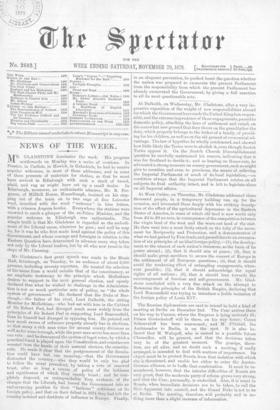Mr. Gladstone's first great speech was made in the Music
Hall, Edinburgh, on Tuesday, to an audience of about 2,000 persons, including seventy reporters. Ile treated the selection of his name from a world outside that of the constituency, as an emphatic testimony to the principle which Midlothian desires to support in the next general election, and openly declared that what he wished to challenge in the Administra- tion is not so much particular acts of policy, as "the whole system of government." He declared that the Duke of Bac- eleugh,—the father of his rival, Lord Dalkeith, the sitting Member for Midlothian,—who had sat with him in the Cabinet of .Sir Robert Peel, had diverged much more widely from the principles of Sir Robert Peel in supporting Lord Beaconsfield, than he himself had diverged in opposing him. He pointed out how much excess of influence property already has in elections, so that many a rich man votes for several county divisions as well as for some borough, while the poor man never has more than one vote ; and he denounced the system of fagot votes, by which a practical fraud is played upon the Constitution, and counties are wrested from the hands of their natural electors, the constitu- ents. He made it clear that the postponement of the dissolu- tion could have but one rneaning,—that the Government distrusted the country,--else they would be only too glad to follow the usual precedent, by taking a vote of renewed trust, after BO long a course of policy of the boldness and significance of which they openly boast ; and he com- pletely disposed, on unimpeachable Tory evidence, of the charges that the Liberabi had forced the Government into an embarrassing position by their " factious " criticisms on its foreign policy, and that on their defeat in 1874 they had left the country isolated and destitute of influence in Europe. Finally, in an eloquent peroration, he pushed home the question whether the nation was prepared to exonerate the present Parliament from the responsibility from which the present Parliament has already exonerated the Government, by giving a full sanction to all its most questionable acts.


































